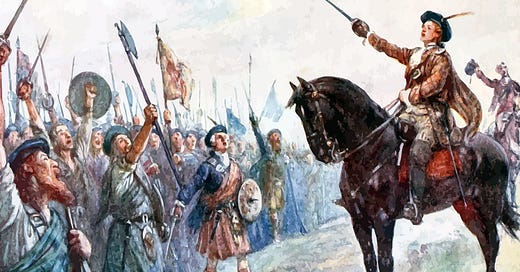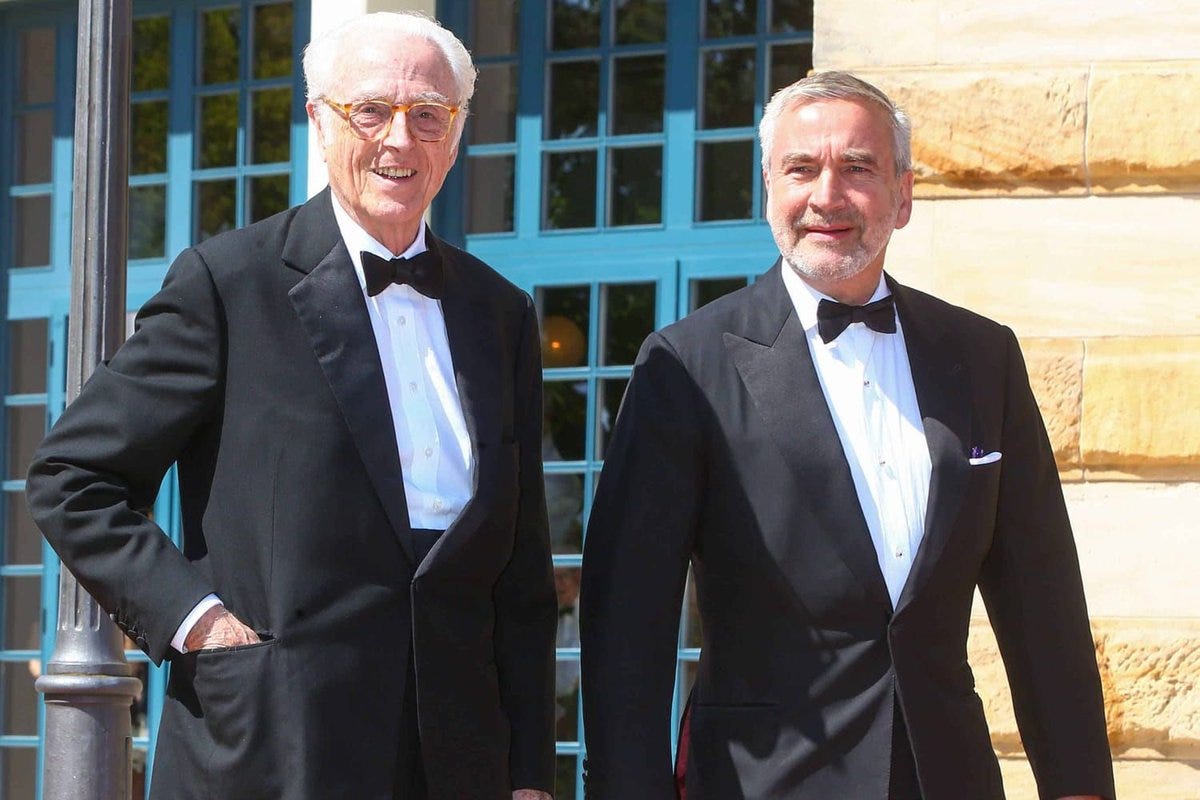Oh Come All Ye Faithful...
GI Gurdjieff, insurrections, authority, and inner work: the Return of the King
Recent events have me thinking quite a bit about Christmas. Specifically, the well-known Christmas Carol, “O Come All Ye Faithful.”
If you attend Church on Christmas Eve, you’re likely to hear this carol, properly titled Adeste Fideles, which is often used as an entrance hymn for candlelight services.
Be very careful.
According to Professor Bennett Zon, the head of the Music Department at Durham University, you might be participating in a subversive political activity as you sing along with this popular carol. And we all know how dangerous it can be to be associated with unauthorized ideas in the current political climate.
You see, Professor Zon claims that Adeste Fideles is not just a popular Christmas Carol, but was originally a rallying cry commemorating the birth of the Jacobite heir Bonnie Prince Charlie.
Prince Charles Stuart, born on December 20, 1720, was the grandson of England's last Catholic monarch, James II. The prince was born in exile in Italy and became the focus of Catholic Jacobite rebels intent on restoring the legitimate monarch to the English throne.
In 1745, Bonnie Prince Charlie raised an army to invade the British Isles, taking Edinburgh, but his insurrection was defeated at the Battle of Culloden on April 16, 1746.
Professor Zon claims there are 'clear references' to the Prince in the carol's lyrics, sometimes attributed to John Francis Wade. Wade was an English Jacobite who fled the country after the failed 1745 Rebellion.
According to Zon, "Fideles is Faithful Catholic Jacobites. Bethlehem is a common Jacobite cipher for England, and Regem Angelorum is a well-known pun on Angelorum, angels, and Anglorum, English."
"The meaning of the Christmas carol is clear: 'Come and Behold Him, Born the King of Angels' really means, 'Come and Behold Him, Born the King of the English' - Bonnie Prince Charlie!"
Zon pointed to other clues indicating the subversive political message contained in the lyrics:
In its earliest forms, from the 1740s to 70s, Adeste Fideles is often found next to, or physically very near, prayers for the exiled monarch.
And in John Francis Wade's books it and other liturgical texts with "hidden" Jacobite meaning are often strewn - even laden - with Jacobite floral imagery.
One of the books containing the carol even contains a colourful picture of the exiled monarch, as well as a Jacobite cryptogram in Latin on its title page.
The defeat of the Jacobite counter-revolution is one of those significant points in the downward spiral of the West, marking the definitive ascendency of the emerging bourgeoisie and their capture of the monarchy and the English church.
So what’s the point? Should we rally around the current Jacobite heir and begin planning the invasion?
Settle down, brothers. That seems like a dead end, at best, for several reasons:
First of all, the current heir to the claims of the historical Stuart monarchs, Franz, Duke of Bavaria, doesn’t inspire much confidence for any kind of counter-revolutionary shenanigans.
The Duke’s spokesman has made it clear that his Jacobite inheritance is merely a "hypothetical issue" and "an entirely British question which does not concern him." In his memoirs, Franz describes his legitimate claim to the throne as a “charming historical curiosity.”
And then there’s the problem of an heir. Franz has no children and, at 90 years of age, is unlikely to father any. Thomas Greinwald has been his “life partner” since 1980.
So sheath your sword (for now); Franz is clearly busy with other interests.
But at this moment, as we watch the ongoing collapse of the Regime in Washington and the failure of the political myths that sustain it, I’m intrigued by the lingering appeal of the “King over the Water,” as the Jacobite heirs were called. Long after Bonnie Prince Charlie’s defeat, some would still yearn for the return of the rightful monarch and the restoration of order.
This same desire is encoded in widespread stories of the heroic king who is sleeping, not dead, and who will return when the country needs him.
In England, according to a popular legend, King Arthur was taken to Avalon to sleep until he was needed by the people of Britain.
In Ireland, the hero Fionn mac Cumhaill sleeps beneath a mound.
Constantine XI Palaiologos, the last emperor of the Eastern Roman Empire, is said to have been transformed into a marble statue, hidden underground until he returns as the Immortal Emperor.
Väinämöinen, the Finnish hero of the Kalevala, departed on a boat, promising to return at the moment of greatest need.
A variation is found in the Grail legends, where the Fisher King is wounded and impotent, which causes his kingdom to become a barren wasteland until a hero arises to complete the Grail Quest.
In more recent times, JRR Tolkien’s epic trilogy culminates in the final book, The Return of the King, where the wandering heir is restored to the throne, signaling the rebirth and restoration of the kingdom.
Stories of the king in exile or sleeping, to return in the moment of the nation’s greatest need, are found across the globe, from Tibet to Peru. There’s a nearly universal sense that things could be better and that what is needed is the restoration of proper authority.
The appeal and the relevance of these stories are clear as we observe the collapse of the West on the nightly news.
The signs are all around us: Our cities are overrun by feral, lawless mobs. Corruption, political correctness, and the competency crisis have rendered US airlines unsafe for travel. Prices for basic necessities have skyrocketed, leaving a shocking number of Americans unable to cover even a $400 emergency expense. In 2022, 73,654 people died from a fentanyl overdose in the US, which is more than the number of US casualties in the entire Vietnam War. San Francisco, once a beautiful gem of a city, now has a poop map to help visitors avoid the piles of human waste left by the hordes of violent zombie junkies who now roam the streets.
These diverse problems have two things in common:
They are all solvable.
None of them are solvable under the current regime.
The reason why these problems cannot be solved is that no one is in charge. Instead of a central authority, we have a corrupt oligarchy made up of big banks, defense contractors, the permanent bureaucracy, and their mouthpieces in academia and the media. As the various factions of the oligarchy compete for wealth, power, and influence, they make use of the power of the state for their benefit, while ignoring the common good and terrorizing law-abiding citizens, a condition that the late Sam Francis called anarcho-tyranny:
In the United States today, the government performs many of its functions more or less effectively. The mail is delivered (sometimes); the population, or at least part of it, is counted (sort of); and taxes are collected (you bet). You can accuse the federal leviathan of many things—corruption, incompetence, waste, bureaucratic strangulation—but mere anarchy, the lack of effective government, is not one of them. Yet at the same time, the state does not perform effectively or justly its basic duty of enforcing order and punishing criminals, and in this respect its failures do bring the country, or important parts of it, close to a state of anarchy. But that semblance of anarchy is coupled with many of the characteristics of tyranny, under which innocent and law-abiding citizens are punished by the state or suffer gross violations of their rights and liberty at the hands of the state. The result is what seems to be the first society in history in which elements of both anarchy and tyranny pertain at the same time and seem to be closely connected with each other and to constitute, more or less, opposite sides of the same coin.
This condition, which in some of my columns I have called “anarcho-tyranny,” is essentially a kind of Hegelian synthesis of what appear to be dialectical opposites: the combination of oppressive government power against the innocent and the law-abiding and, simultaneously, a grotesque paralysis of the ability or the will to use that power to carry out basic public duties such as protection or public safety. And, it is characteristic of anarcho-tyranny that it not only fails to punish criminals and enforce legitimate order but also criminalizes the innocent. At the same time the governor of North Carolina grotesquely fails to uphold his famous oath to protect the citizens of his state by keeping convicted felons in prison, he has no problem finding the time to organize a massive waste of his time and the taxpayers’ money to hound and humiliate a perfectly innocent citizen for the infraction of a trivial traffic law.
Mr. Francis wrote this in 1994, and one wonders what he would think of the U.S. in 2024, where cities like San Francisco and New York have effectively decriminalized shoplifting, but attending a Latin Mass might get your name on a terrorist watch list.
Anarcho-tyranny results when a nation is ruled by predators, those who use the coercive power of the military, police, and courts, supported by propagandists in the media and academia, to enrich themselves at the expense of the people.
GI Gurdjieff explains:
“And in my opinion, as you also will surely understand eventually, it was precisely this second of the two mentioned chief abnormally established forms of ordinary being-existence, namely, the assigning of each other to different classes or castes that had specially become there the basis for the gradual crystallization in the common presences of these unfortunate favorites of yours, of that particular psychic property which, in the whole of the Universe, is inherent exclusively only in the presences of those three-brained beings.
“This exclusively particular property was formed in them soon after the second Transapalnian perturbation there, and, gradually undergoing development and becoming strengthened in them, was passed from generation to generation by heredity, until it has now already passed to the contemporary beings as a certain lawful and inseparable part of their general psyche, and this particular property of their psyche is called by themselves ‘egoism.’”
-GI Gurdjieff, Beelzebub’s Tales to His Grandson
This “assigning of each other to different classes or castes” is not the natural ordering of society according to degrees of objective reason and Being that is characteristic of normal states. This “assigning” is for subjugating and exploiting the labor of the many to support the excess and degeneracy of a few.
These predators compete like rival Mafia gangs over the spoils of their conquest. These struggles are often masked by political campaigns and debates, what Mr. Gurdjieff referred to as “puppet shows.”
Neither faction in these debates has any interest in serving the needs of the whole; when power is dispersed in different centers rather than centralized, there’s an endless struggle to seize power where it can be found and an incentive to mobilize one segment of society against another, using real or imagined grievances. Discovering new kinds of oppression, micro-aggressions, and offenses becomes an integral part of the appropriation and exercise of power. The demonization and grievance culture that characterizes contemporary political discourse isn’t accidental - it’s essential to the struggle for power among what Mr. Gurdjieff calls “power-possessing beings.”
Contrary to what you may hear from various New Age groups and individuals claiming to represent the “Fourth Way”, Mr. Gurdjieff has quite a bit to say about government, the exercise of power, and legitimate authority.
Early in Beelzebub’s Tales to His Grandson, he cites the example of King Appolis:
And so, my boy, this is how it was. King Appolis, who had been extremely conscientious in respect of the duties he had taken upon himself for the maintenance of the greatness of the community entrusted to him, had spared neither his own labor nor wealth, and at the same time he demanded the same from all the beings of his community.
But this doesn’t mean that Mr. Gurdjieff advocates monarchy as the complete solution. He is very critical of both monarchies and republics as forms of government.
A change in structure alone is insufficient. And while monarchy has features that make it far superior to a republic, both forms are missing something essential.
There’s a clue in the King’s name. Appolis is derived from the name of the god Apóllōn or Apollo, the Sun God. The King doesn’t rule because he has seized power, as the result of political machinations, or merely because of birth, but because he is a representative of a higher power, the Sun, which in turn is a representative of the Most Holy Sun Absolute, the abode of His Endlessness.
This alone is the mark of legitimate government.
It’s not by chance that ancient monarchies were associated with the Sun God. In Egypt, the pharaoh was seen as the representative of the Gods, specifically Ra and Horus, and his task was to mediate, to be a reconciling force, between the Gods and his subjects. The Pyramid Texts explain that his role was to "Bring Maat and repel Isfet", to promote harmony and repel chaos.
“Do you not know, Asclepius, that Egypt is an image of heaven or, to be more precise, that everything governed and moved in heaven came down to Egypt and was transferred there? If truth were told, our land is the temple of the whole world.”
―Hermes Trismegistus
In Japan, the Emperor is said to be the direct descendant of the Sun Goddess Amaterasu Ōmikami. The Japanese word for emperor is tennō (天皇, "heavenly sovereign"), and he also mediates between the Gods and the people, ensuring harmony and peace in the realm. (One of the terms forced on Japan, after the United States killed hundreds of thousands of Japanese civilians with genocidal firebombings and atomic bombs, was the renunciation of this role for the Emperor, giving an important clue to the real aim and methods of the “liberal international order.”)
In India, the Sūryavaṃśa ( 'Descendants of the Sun') dynasty was founded by Ikshvaku, one of the ten sons of Manu. According to Buddhist tradition, Gautama Buddha descended from this dynasty.
In China, the Emperor was known as the “Son of Heaven;” His reign was legitimate as long as he had the “mandate of heaven” and was an effective mediator between the divine order above and his realm. This idea meant that the throne wasn’t tied to a particular family line, and it was even possible for peasants to establish new dynasties, like the Ming and Han dynasties. These were seen as legitimate because they effectively served as representatives of the Gods.
Centralized authority representing the Sun God and working as a reconciling force between heaven and earth is the definition of legitimate authority and civilization. The monarch works to replicate heavenly order in the kingdom so that the citizens can collectively engage in the ‘Trogoautoegocratic’ process, allowing each to develop according to their potential and for the nation as a whole to function as a “mirror of heaven.”
The late Egyptologist John Anthony West said the reason he took people on tours of Egypt was to show them what a civilization looked like, and this is precisely what he meant.
So the solution isn’t as simple as just installing a monarch. A change in structure alone isn’t a solution; we need a certain quality of individuals capable of acting as a reconciling force. Sun Kings aren’t born, they are initiated.
“A collective existence is only possible through one system: that of Mr. Ashiata Shiemash. Right now, our only concern is the development of candidates to become future followers of Ashiata Shiemash. Later on we will choose among them. Do you understand?”
-GI Gurdjeff, Paris Meetings 1943
If you’re familiar with the work of various organizations and individuals claiming to represent the Gurdjieff Work, this statement may come as a surprise. You’ve probably heard that the Work has nothing to do with politics. But Mr. Gurdjieff says this project - to develop candidates to become followers of Ashiata Shiemash - is “our only concern.”
According to the narrative in Beelzebub’s Tales to His Grandson:
“The Very Saintly Ashiata Shiemash was the only Messenger sent from Above to your planet who succeeded by His holy labors in creating on that planet conditions in which the existence of its unfortunate beings somewhat resembled for a certain time the existence of the three-brained beings of the other planets of our great Universe on which beings exist with the same possibilities; and He was also the first on that planet Earth, who for the mission preassigned to Him refused to employ for the three-brained beings of that planet the ordinary methods which had been established during centuries by all the other Messengers from Above.”
Ashiata Shiemash, like Jesus, Mohammed, the Buddha, and others, was a Messenger sent to normalize conditions on planet Earth. According to the Tales, conditions on this planet are uniquely dysfunctional, for reasons that we’ll have to get into in another post.
Ashiata Shiemash stands out because for a short time he was able to begin the process of normalizing being conditions. The ‘abnormal conditions’ on planet Earth are a key concern of Mr. Gurdjieff; this and related terms are used dozens of times throughout the book (and, curiously, rarely in discussions of the Work). What are the abnormal conditions? You already know something about them: turn on the nightly news, or look out your window in any large city, and you’ve got some idea of what they are. There’s more to it, but you know things aren’t right.
You can read about the labors of Ashiata Shiemash in detail in Chapters 25-29 of Beelzebub’s Tales to His Grandson, but here’s an overview:
Ashiata Shiemash began his labors with a small monastic brotherhood:
“he began enlightening their Reason by means of objectively true information, and guiding their being-impulses in such a way that they could sense these truths without the participation either of the abnormally crystallized factors already within their presences, or of the factors which might newly arise from the results of the external perceptions they obtained from the abnormally established form of ordinary being-existence.”
He instructed these brothers how to manifest what he called Objective Conscience, which is buried and occluded in most men. Ashiata Shiemash taught that Objective Conscience, the representative of Our Common Father, could be recovered and made part of the ‘waking state’ with sufficient efforts.
After instructing these brothers, he sent them out to nearby monasteries, to instruct members of these communities. Each brother, if he wished to be counted as an “All Rights Possessing Brother” of the Order, was required to attain “the ‘ableness’ to know how to convince all the three separate spiritualized and associating parts of a further hundred three-brained beings there, concerning the Divine impulse conscience.”
And so the brotherhood grew into a network of initiates throughout the region.
The inner work of these brethren produced effects that were observable, even by the uninitiated. These ‘objective attainements’ were such that they inspired others outside these communities to also strive the make Objective Conscience part of their waking state.
These efforts had real-world consequences. According to the narrative, within 10 years, the abnormal divisions of class and caste, imposed by the power-possessing beings, disappeared, along with their corrupt and self-serving state organizations. For a time, life began to normalize, under the direction and instruction of these initiates.
These efforts were subsequently destroyed by the efforts of a revolutionary political activist, Lentrohamsanin, with the assistance of what Mr. Gurdjieff calls “learned beings of new formation”, academics who were not initiates. The details are for another post; you can find them in Chapter 28 if you’re eager to find out.
This organization established by Ashiata Shiemash is the aim of the Work. As mentioned above, Mr. Gurdjieff said, “Right now, our only concern is the development of candidates to become future followers of Ashiata Shiemash.”
This was the aim and method advocated by Mr. Gurdjieff, and he believed it is the only means by which a continued collective position is possible.
If you’re interested in connecting with others who are interested in working towards implementing this program, the Spiritual Sun School offers weekly classes, seminars, discussion groups and personal tutorials for qualified and highly motivated candidates. For more information, visit the website at Gurdjieff.work.
Have a Merry Christmas!
Additional reading:









